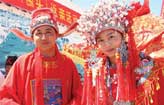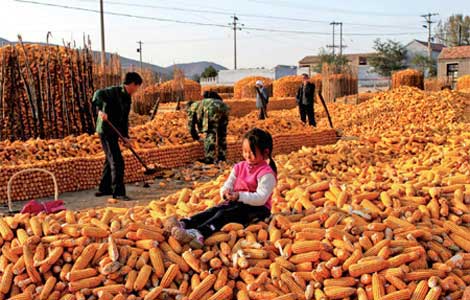Foreign and Military Affairs
Obstacles remain in cementing China-Japan ties
Updated: 2011-08-05 13:52
(Xinhua)
BEIJING - Though hundreds of miles apart, Tanjiaqiao township and Fangzheng county have both slipped into controversy after netizens shamed residents of both regions for kowtowing to money and forgetting the humiliation China suffered during Japan's invasion of China in the 1930s and 1940s.
At the Purentan Scenic Area, located in Tanjiaqiao township in East China's Anhui province, Chinese tourists were photographed wearing garb similar to that worn by Japanese soldiers that invaded China some 80 years ago.
In a photo widely forwarded by microbloggers, a dozen tourists were depicted dressed as Japanese soldiers, complete with mimicked guns and a military motorcycle.
Lu Ye, a project designer with the Jiufu Tourism Development Company, said that a 20-minute interactive drama detailing a historic attack by the Chinese army against Japanese invaders was being organized at the scenic spot. The intention of the drama was to educate young Chinese about the country's history, Lu said.
"As professional cast members have yet to be recruited, we only had the props ready. The youngsters in the photo were tourists who came here to participate in a match-making party on July 30. When they heard that we were to stage an interactive drama, they put on the props with the assistance of our tour guides for fun," Lu said.
"After seeing that photo on Wednesday morning, I realized the seriousness of our mistake. I feel very sorry for causing any misunderstanding and hurting the feelings of the public. The drama in question has never been staged formally or informally," said Luo Fayi, general manager of the Puren Tourism Company, the operator of the scenic area.
Sources with local cultural and tourism authorities confirmed that no interactive performances are allowed to be staged in the area without an official endorsement.
Despite the operator's apology, discontent and criticism regarding the incident remain contagious online.
"It made me want to vomit, seeing these young people so merrily recreating our painful history. The scenic area operator must be money-hungry to turn a national scar into entertainment," said a netizen using the screenname "diguoliangmin" on bbs.voc.com.cn, a popular Chinese news portal.
A monument that was erected in July in Fangzheng county, located in Northeast China's Heilongjiang province, has provoked an equal amount of anger and disdain.
During Japan's invastion of China, Japanese military authorities dispatched 330,000 settlers to claim parts of China. When Japan surrendered in 1945, there were still about 15,000 Japanese settlers living in Fangzheng, said Wang Weixin, director of the foreign affairs office of the Fangzheng county government.
"Due to the long journey (back to Japan) and the spread of disease, more than 5,000 Japanese settlers died in the county," Wang said.
Hong Zhenguo, the county's vice head, denied that the monument was erected to attract Japanese investment. "It was erected to help both Japanese and Chinese youth to better understand history and to encourage future generations to cherish peace," he said.
Many Chinese, however, are not buying his explanation, especially those who have taken a hard line against Japan over bilateral disputes.
According to a microblog user with the screenname "sima nan," five Chinese from the United Baodiao Association, a non-public organization dedicated to protecting China's sovereignty over the Diaoyu Islands in the East China Sea, poured red paint on the monument on Wednesday afternoon. The vandals were briefly detained by local police before boarding a train for Beijing, according to a post on the user's microblog.
"Building cemeteries or erecting monuments for the Japanese is acceptable. But opponents can not accept having the word 'settlers' inscribed onto the monument, because even the most tolerable Chinese cannot deny that the armed Japanese settlers were actually invaders," a netizen using the screenname "li mu" posted on his sina.com microblog.
Guo Dingping, director of the Center for Japanese Studies at Shanghai's Fudan University, said that the distrust between Chinese and Japanese people has historical reasons.
"It's not easy to change the sentiment, especially when Japan's ultranationalists keep instigating hostility toward China," said Guo.
On Thursday, the education board of Japan's second largest city, Yokohama, adopted history and civics textbooks compiled by controversial publishing house Ikuhosha to be used at 147 public junior high and other schools from next spring, Japan's Kyodo News reported.
The textbooks refer to the Pacific War as the Greater East Asian War or as a war for Japan's survival and self-defense. Opponents accused the textbooks as "justifying wars," Kyodo said.
In its 2011 defense report released on Tuesday, Japan challenged Beijing's military budget and voiced concern over China's "assertiveness" in dealing with international conflicts.
China's Ministry of Foreign Affairs hit back at the report's "irresponsible comments," reaffirming that "China has not and will never be a threat to any other country."
"It is easy to understand the psychology of Japan, as China has rapidly shaken off poverty to become a strong neighbor in mere decades. While some Japanese feel regret for their country's brutal aggression against China in the past, there is also the fear of a stronger China," said Guo.
Fan Yuntao, a professor with the Tokyo-based Asia University of Japan, feels that relations between the two countries remain clouded by a collision that took place between a Chinese fishing boat and Japanese patrol vessels in waters near the Diaoyu Islands on September 7, 2010.
However, Guo believes that it is unnecessary to be pessimistic about the two countries' friendship.
"When we sit down face-to-face at the table, whatever problems and disputes we have may be much easier to get over," said Guo.
Fan said that the best way to break down mutual distrust and misunderstanding will be for both sides to walk in each other's shoes and make persistent efforts to understand each other.
One hundred schoolchildren from 23 schools in Japan's earthquake and tsunami-hit prefectures of Fukushima, Aomori, Iwate, Miyagi and Ibaraki are currently vacationing in south China's resort island of Hainan as the guests of Premier Wen Jiabao.
In Tokyo, a series of memorial activities kicked off on Wednesday to mark the centenary anniversary of the 1911 Revolution in China, which, led by Dr. Sun Yat-sen, ended the Qing Dynasty (1644-1911), China's last feudal empire. Sun lived in Japan for about ten years.
"To steer bilateral non-governmental exchanges toward a healthy track, the two countries should facilitate frank exchanges between news media. I believe that mutual trust between media organizations can play a pivotal role when disputes and misunderstandings arise," said Fan.
E-paper

My Chinese Valentine
Local businesses are cashing in on a traditional love story involving a cow herder and a goddess
Outdoor success
Lifting the veil
Allure of mystery
Specials

Sowing the seeds of doubt
The presence in China of multinationals such as Monsanto and Pioneer is sparking controversy

Lifting the veil
Beijing's Palace Museum, also known as the Forbidden City, is steeped in history, dreams and tears, which are perfectly reflected in design.

Beer we go
Early numbers not so robust for Beijing's first international beer festival
